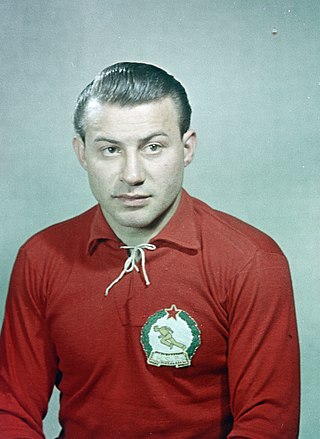
Ferenc Puskás was a Hungarian footballer and manager, widely regarded as one of the greatest players of all time and the sport's first international superstar. A forward and an attacking midfielder, he scored 84 goals in 85 international matches for Hungary and played four international matches for Spain. He became an Olympic champion in 1952 and led his nation to the final of the 1954 World Cup. He won three European Cups, ten national championships and eight top individual scoring honors. Known as the "Galloping Major", in 1995, he was recognized as the greatest top division scorer of the 20th century by the IFFHS. With 806 goals in 793 official games scored during his career, he is the seventh top goalscorer of all time.

Zoltán Kocsis was a Hungarian pianist, conductor and composer.

Budapest Honvéd Football Club, commonly known as Budapest Honvéd or simply Honvéd, is a Hungarian sports club based in Kispest, Budapest, with the colours of red and black. The club is best known for its football team. Honvéd means the Homeland Defence. Originally formed as Kispest AC, they became Kispest FC in 1926 before reverting to their original name in 1944.

Nándor Hidegkuti was a Hungarian football player and manager. He played as a forward or attacking midfielder and spent the majority of his playing career at MTK Hungária FC. During the 1950s he was also a key member of the Hungarian National Team team known as the Golden Team. Other members of the team included Ferenc Puskás, Zoltán Czibor, Sándor Kocsis and József Bozsik. In 1953, playing as a deep lying centre-forward, a position which has retroactively been compared to the modern false 9 role, he scored a hat-trick for Hungary when they beat England 6–3 at Wembley Stadium. Playing from deep, Hidegkuti was able to distribute the ball to the other attackers and cause considerable confusion to defences. This was an innovation at the time and revolutionised the way the game was played.

Sándor Péter Kocsis was a Hungarian footballer who played for Ferencváros TC, Budapest Honvéd, Young Fellows Zürich, FC Barcelona and Hungary as a striker. During the 1950s, along with Ferenc Puskás, Zoltán Czibor, József Bozsik and Nándor Hidegkuti, he was a member of the Mighty Magyars. After the 1956 Hungarian Revolution, he moved to Spain where he became a member of the FC Barcelona team of the late 1950s.

Gusztáv Sebes was a Hungarian footballer and coach. With the title of Deputy Minister of Sport, he coached the Hungarian team known as the Mighty Magyars in the 1950s. Among the players in the team were Ferenc Puskás, Zoltán Czibor, Sándor Kocsis, József Bozsik, and Nándor Hidegkuti. Together with Béla Guttmann and Márton Bukovi, he formed a triumvirate of radical Hungarian coaches who pioneered the 4-2-4 formation.

Zoltán Czibor was a Hungarian footballer who played for several Hungarian clubs, including Ferencváros and Budapest Honvéd, and the Hungary national team before joining CF Barcelona. Czibor played as a left-winger or striker and was notable for having a powerful shot, good pace and excellent ball control. During the 1950s he was part of the Magical Magyars, reaching the World Cup final with them in 1954. After the 1956 Hungarian Revolution he moved to Spain where he became a prominent member of the successful FC Barcelona team of the late 1950s. After three seasons at Barcelona, he joined their local rivals Español for the 1961–62 season. After brief spells at FC Basel, Austria Wien and Primo Hamilton FC, he retired as a professional footballer and returned to Hungary. He died there in 1997, aged 68.
The Hungarian National Philharmonic Orchestra is one of the most prestigious symphony orchestras in Hungary. Based in the capital city of Budapest, it has stood as one of the pillars of the country's musical life since its founding in 1923 as the Metropolitan Orchestra. Zsolt Hamar is the current musical director.

László Budai, also known as László Bednarik, or Budai II, was a former Hungarian footballer and coach. Budai was born in Budapest and played as a midfielder and forward for Ferencvárosi TC, Honvéd and Hungary. During the 1950s he was a member of the legendary Hungarian national team known as the Mighty Magyars. Other members of the team included Ferenc Puskás, Zoltán Czibor, Sándor Kocsis, József Bozsik and Nándor Hidegkuti. The stadium of Rákospalotai EAC was named after him.
Jenő Kalmár, also referred to as János Kalmar or Kálmár Jenő, was a former Hungarian footballer and coach. As a player, Kalmar played for both MTK Hungária FC and Hungary. During the 1928-29 season he finished as top goalscorer for MTK, scoring 20 goals.
Charles R. Kocsis was an American amateur golfer.

Erzsébet Kocsis is a Hungarian former handball player and the current technical director of Dunaújvárosi NKS. She was voted IHF World Player of the Year in 1995 by the International Handball Federation.
Football is the most popular sport in Hungary. The Hungarian Football Federation is the highest body of professional football in Hungary and was founded in 1901. The Hungary national team has played in numerous international tournaments, including the inaugural football tournament in the Olympic Games, nine World Cups, and two European Championships. Their greatest achievements are the three gold medals in the 1952, 1964 and 1968 Olympic Games, and the runner-up in the 1938 and 1954 World Cups. The team known as the Mighty Magyars was also the first non-British team to defeat England, 6–3 at Wembley in 1953. Months later, they defeated the English by a convincing 7–1 in Budapest in 1954, the worst defeat in the history of the English team.
Lajos Kocsis was a Hungarian football midfielder, who played for Bp. Honvéd SE. He was an Olympic champion in 1968.

Dezső Ránki is a Hungarian virtuoso concert pianist with a broad repertoire and a significant discography of solo, duo and concerto works.
Kocsis is a Hungarian surname, from the Hungarian word kocsi. Kocsis in Hungarian means coachman.
Ferenc Rados is a Hungarian pianist and professor of piano and chamber music. Until 1996, he taught at the Franz Liszt Academy of Music in Budapest, Hungary. After retiring, he gave master classes in Europe and Asia. Rados was awarded the Kossuth Prize in 2010.
Hungary v England (1954) was an international football game played on 23 May 1954. The game was played between the Hungary national football team—then the world's number one ranked team and the Olympic champions—and the England national football team, hailing from the birthplace of the game of football and reputed "Kings of Football". The game was a return fixture from the 1953 game in the old Wembley Stadium, where Hungary had beaten England 6–3.

Anatoly Mikhailovich Bykov is a retired Soviet welterweight Greco-Roman wrestler. He won a world title in 1975 and an Olympic gold medal in 1976, and placed second at the 1978 European Championships and 1980 Olympics, both times behind Ferenc Kocsis.

Orvosegyetem Sport Club is a Hungarian professional water polo club from Budapest established in 1957 in the Semmelweis University.













